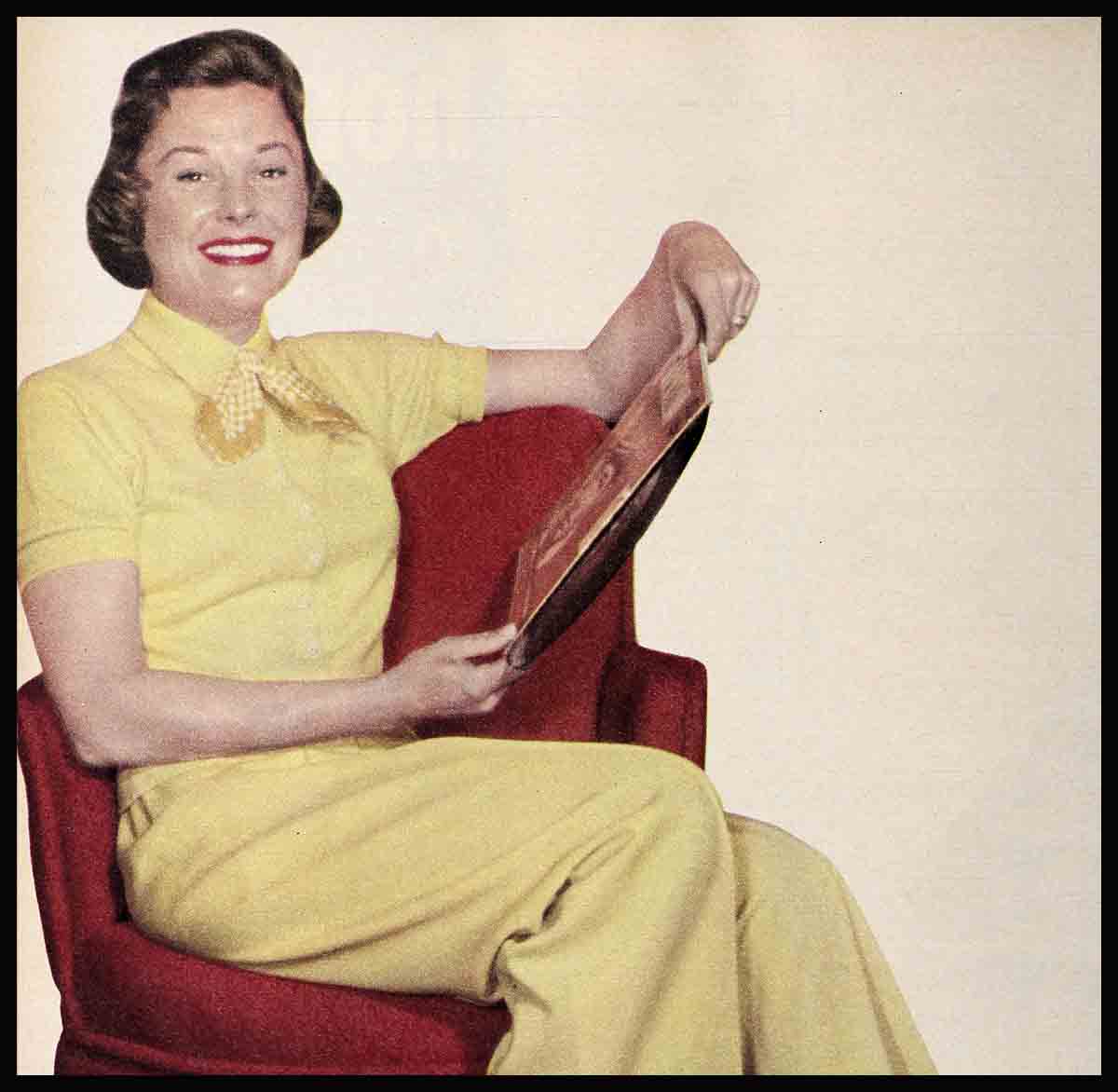
She Couldn’t Say Yes! She Couldn’t Say No!—June Allyson
Time was when June Allyson sat beside a ringing telephone, unable to pick it up. How did she know what the people at the other end of the line would ask her? How could she be sure she could answer them, make whatever decision might suddenly be necessary, meet whatever crisis might come winging across the wires?
Time was, too, when June Allyson was regularly, incurably, hopelessly late for everything. Not because she couldn’t get there on time, if that was all she had to do. But simply because at every turn she was met by people who wanted er to do this, decide that, make a choice on something or other before she left. And making choices was something Junie just couldn’t do in a hurry.
And then there was the time, just recently, when Director Joe Pasternak was perfectly justified ip patting the blonde Allyson pate paternally and telling the assembled cast and crew on the set of M-G-M’s “The Opposite Sex,” “When she looks up at you with a sweet smile and says, ‘I’ll try,’ beware. That means she doesn’t really want o and probably won’t.” Mr. Pasternak had reason to believe he knew his Junie, because during all the years she had been under contract to the studio, that was exactly her behavior pattern. And this time, too, when his speech was finished, little Junie looked up at him and smiled sweetly. No comment.
But the next day, the director began explaining a scene in which June was to be high in the saddle. On a horse. As it happens, June does not like horses and has a deepseated suspicion that the dislike is mutual.
“Now, in this scene,” said Mr. Pasternak, “you were riding along with the boy.”
“Unh-uh,” interrupted little Junie.
“Yes, honey,” he continued patiently. “You’re riding along on this horse and—”
“No. I am not riding along on this horse. The scene can be done just as well on the ground, and I will not ride any horse.”
The director stared at her in bewilderment. June had not smiled sweetly and said, “I’ll try.” She had plain and simply said, “No.” They locked eyes for a brief ten seconds before Mr. Pasternak picked up a pencil to cross out the horseback scene that would have to be rewritten. Then he shook his head sadly and began reconstructing his mental image of June Allyson. After all these years she had learned to say no.
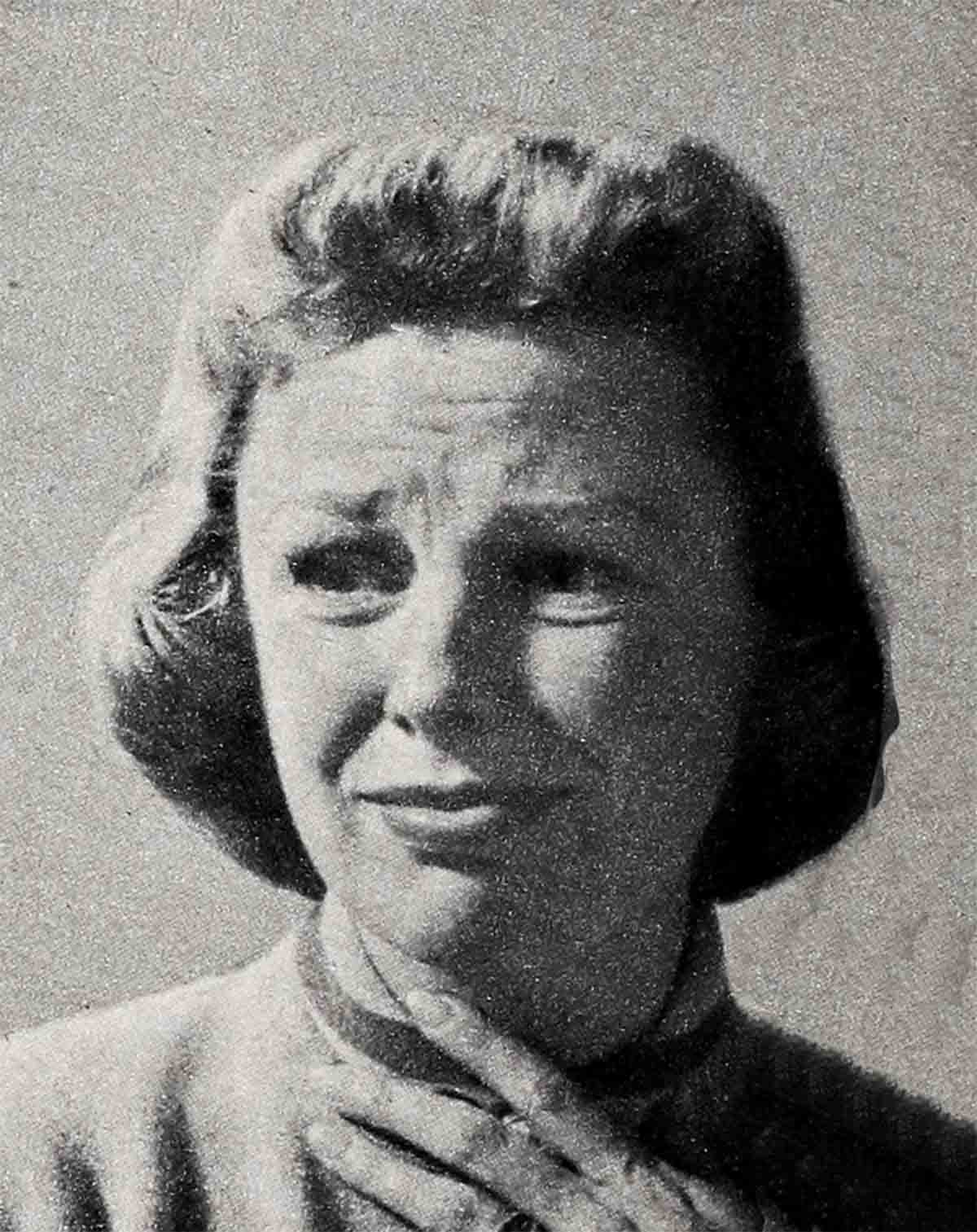
Before, I did things that made me absolutely miserable, just because I wanted everyone to like me,” June said later. “I’ve found out the hard way that you are rarely wrong when you’re completely honest with yourself. I can listen and be convinced. I can also say I’m sorry, you’re absolutely right, when it turns out that I am wrong. But gee, why not say a flat no or yes if you feel that way, instead of wasting all that time and going through all that misery? I’ve learned that people like you so much better when they know where you stand. Or, if they don’t like you more, at least they respect you.”
June’s ability to accentuate the Allyson viewpoint, firmly and with conviction, was no overnight achievement. She has always had the quiet, steadfast encouragement of one Richard Powell, but the decision to break out of the pseudo-secure mold provided by her husband and studio had to be her own. For years June relied on Richard for the answers on their family, household help, plans and, yes, even her clothes. At M-G-M she was given the careful, cotton-batting treatment befitting a star. Everyone else decided things. She was a beloved adolescent whose suggestions, questions and possible rebellions were received with patience—and a deaf ear.

June started to grow up at the time that Richard began producing and directing pictures. Suddenly the inner workings of the industry—from direction to special effects—became a fascinating new world, because she wanted to be able to talk intelligently to her husband about his work. She began not only to listen but to absorb what went on about her. She saw the intricacies and the myriad of details involved in the production of a picture. She started to grow, and with this initial growth came a desire to become an individual in every phase of living.
At home she was slowly emerging from complete dependence on Richard. He waited and watched, helping where he could, sometimes jolting her into action, sometimes easing the wounds incurred in trial and error. Possibly most important, he also admitted that she was right when she made a decision of her own against his advice. Although he discouraged her from taking the unsympathetic role of the wife in “The Shrike,” Richard was the first to tell June what an excellent job she had done after she had rebelled and accepted the part anyway.
He helped in other ways. “One night,” June remembers, “I came wailing down the stairs and threw myself on the divan to cry my heart out. I was waving a newspaper column that had given me an especially bad dose of publicity. ‘Why me?’ I sobbed.”
“Why not you?” asked Richard quietly.
“That stopped me cold,” June admits. “He was so right. I had reached the point in my career where an occasional nasty bit of publicity was considered par for the course by most stars. But me—I wanted to be different, to have everyone like me. Now I know that’s impossible.”
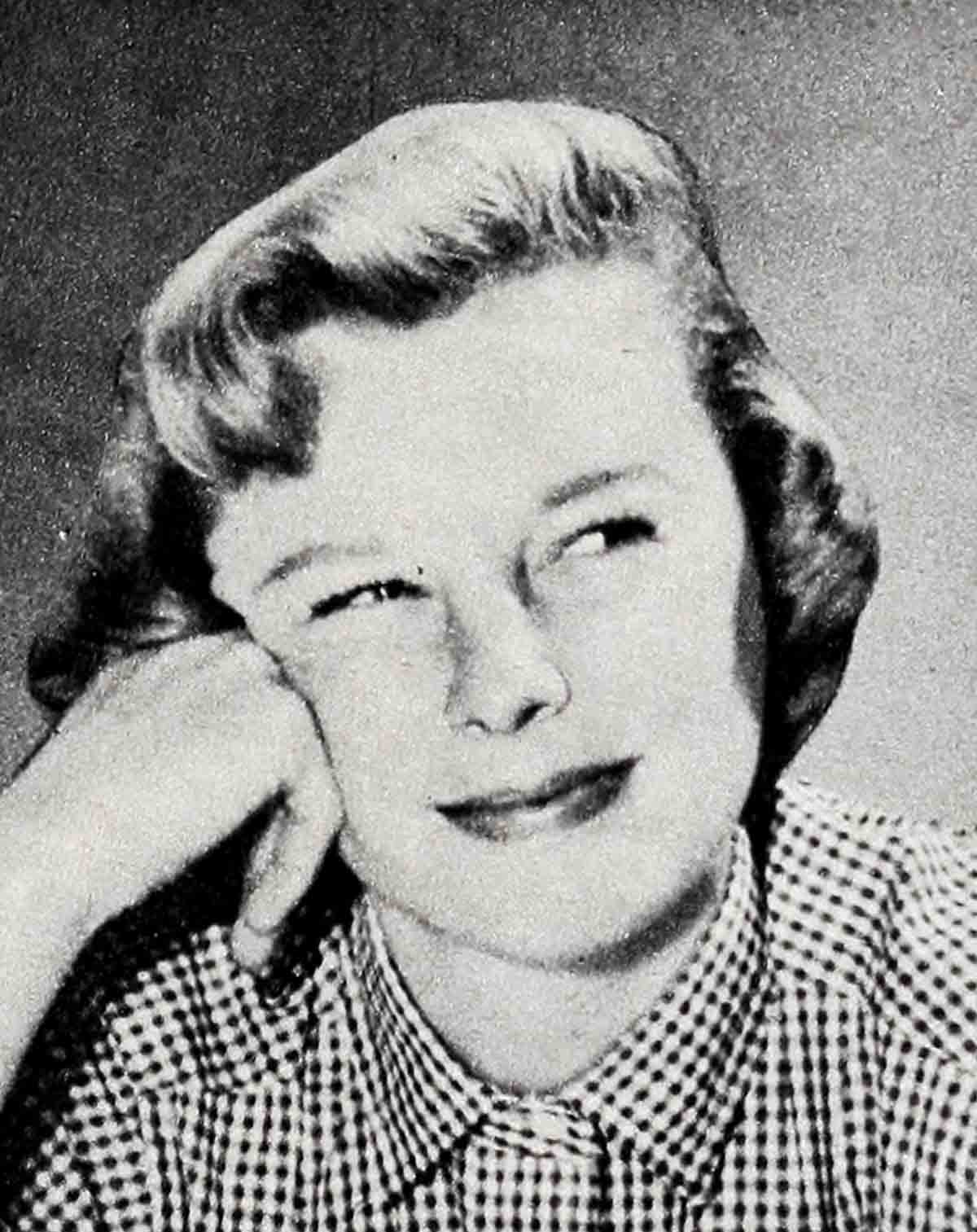
When M-G-M’s Helen Rose designed her magnificent wardrobe for “The Opposite Sex,” June was aghast. The items she was expected to wear were sheaths and straight skirts—and sexy. And June peter-pan-collar Allyson had always been timidly stubborn about the simple-type clothes she prefers. Customarily, she would find a dress she liked and have it made up in five different colors. But this year June has decided that Helen Rose may be right, after all. She just might be ready for a change.
“I remember one day when Esther Williams and I were both in Wardrobe for fittings,” June confessed recently. “Esther was trying on a gorgeous bathing suit that I went mad for and raved that I wanted one just like it. ‘Don’t be silly,’ Esther quipped. ‘How can you put a peter pan collar on it?’ And, you know, she was right? I would have tried.”
Clothes, among other things, come in for quite a bit of discussion between June and her Girl Friday, Barbara Salisbury. Barbara is secretary, friend, companion, soothsayer and limerick-writer for the effervescent Allyson. When not working on a picture, June and Barbara start the day with many cups of coffee, a discussion of the news and an exchange of any hilarious tidbits each of them might have picked up. Hence, Barbara is perhaps more aware than most of the decided change in Mrs. Powell.
“June is so much more prompt now,” says Barbara. “She used to drive people mad by always showing up late. But there was a reason. She was always late because she couldn’t say no to anyone, so she had too much to do. Or she couldn’t say yes, and get it over with. Even simple little decisions weighed on her until they took on major proportions. Subconsciously she managed to distract herself until she was never completely with any one thing. Lack of confidence in herself was the reason.”
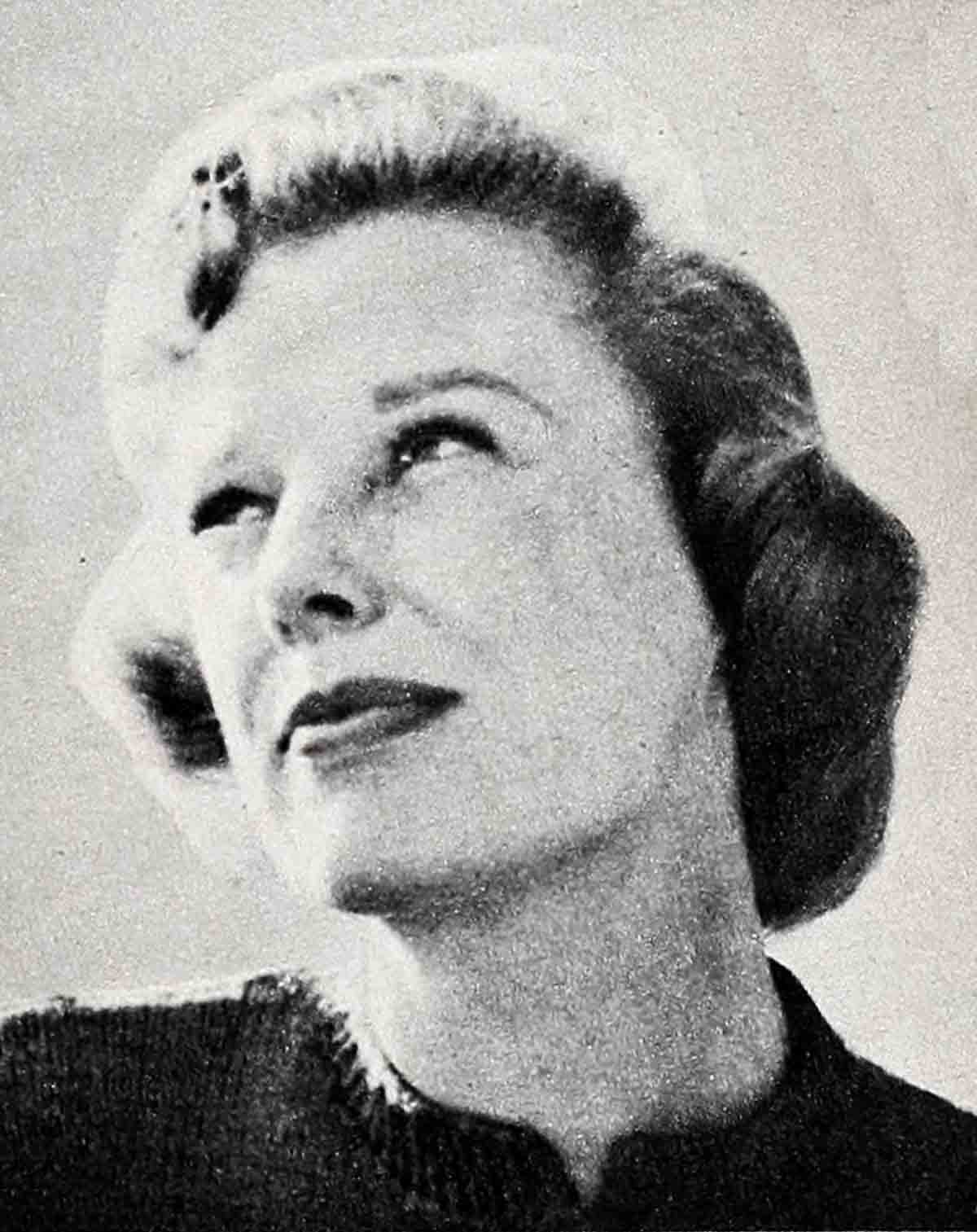
Barbara paused and thought back over the last couple of years. “In the past, June was afraid to take her children, Ricky and Pamela, anywhere without their nurse, Mrs. Harvey. Lately, however, she and Richard have taken them to Palm Springs, the Santa Barbara Horse Show and the Luau for dinner, and June is finally convinced of her ability to cope with any situation that might arise. And both Ricky and Pamela are learning to respect their mother’s firm ‘No.’ For most of his young life Ricky has managed to wheedle June into playing with him at nap time. Now that’s changed. Now a very surprised little boy finds himself in bed, expected to have his nap promptly.
“Incidentally,” Barbara says, with a smile, “Ricky is becoming quite a personality. The Powells have a routine that is the loveliest part of the day to them: Before dinner they sit in front of the burning logs in the fireplace and visit with the children. While Pam, Ricky and Richard hold animated conversations, June picks, punches and sometimes eats the cheese delicacies on the coffee table. Quite naturally, from time to time she and Richard get into highly stimulating discussions of one of a million subjects. On the night I’m thinking of, Richard was pro and June was con.”
“That’s absolutely ridiculous,” protested the husky voice of Mother June.
“No, it isn’t. It’s perfectly natural,” countered her relaxed husband.

“Oh, Richard!” June exclaimed in exasperation.
“Oh, Daddy,” piped up the tenor tones of Ricky, “you stay out of this!”
They were both stopped in their tracks. When June saw her husband’s expression, she howled and Richard finally joined in. Ricky was quite pleased with himself—and was only mildly chagrined when his amused parents straightened up to explain why small boys do not tell big dads to stay out of things.
During this family hour, however, both Pam and Ricky have an insidious method of taking over the conversation, and the Powells admit with due modesty that at times the youngsters make more sense than many of the adults who often gather around the coffee table before dinner.
The change in June about decisions is wonderful to behold. Time was when she was in a constant state of vacillation, but no more. Just a few months ago the Powell household needed a cook desperately. June was visiting a friend whose cook just happened to be leaving and could fill in for a few weeks if the Powells wanted her. June talked to the woman for a few minutes, then up and hired her. It was a big step forward—no waiting for advice from Richard, no seesawing of “Should I or shouldn’t I?” The cook, by the way, is still a member of the Powell menage, and everyone concerned is happy.
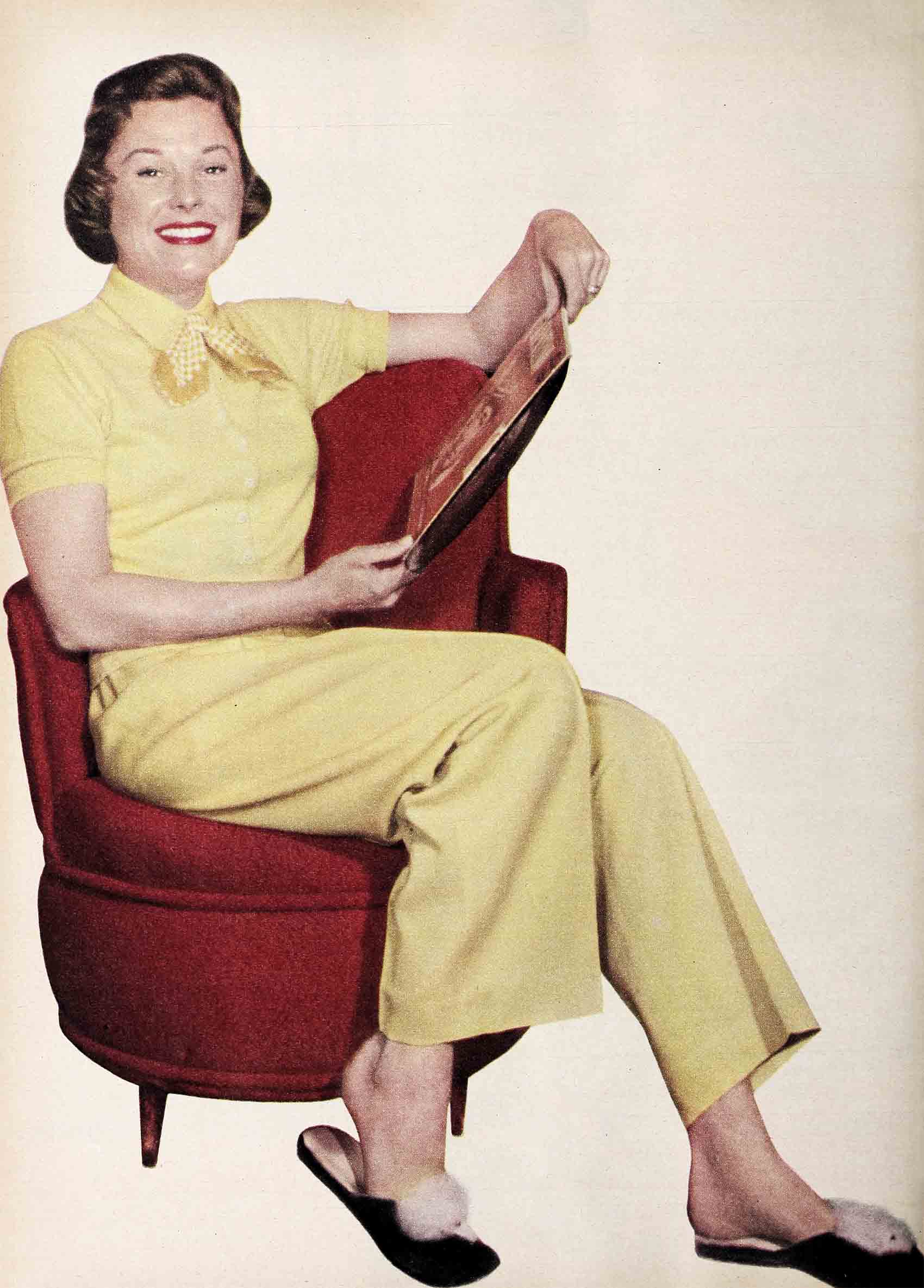
“When I go through the Powells’ lower gate in the morning,” Barbara Salisbury says, “it’s like driving into another world. Suddenly I’m in the peace and quiet of the country, surrounded by beautiful trees and the green green that no city care can contrive. The house itself has been blended with the beauty of nature which was put there to be used. Inside, it’s warm, friendly and full of the feeling of family. There was a time when Richard and George Hall, the decorator, got together to decide on any possible changes, June accepting the arrangement with passive interest. Last month, however, it was June who conferred with George on the divans, curtains, drapes—and she very definitely wanted a brass headboard in the master bedroom. After long discussions she took four possible choices to Richard, then they decided together on colors, textures and whatnot. June taking the initiative is one more significant sign of her desire to become an individual.
“Don’t, for heaven’s sake,” Barbara adds suddenly, “think that June has become grim and determined in an effort to prove herself. The fun-things and the crazy, impulsive acts are still with us. Her giggle is still the same. She still makes up atrocious limericks about friend and foe, and still makes personal gifts for people she likes. She has been on an eyeglass-case kick for the past two years, and she makes each one with the color or design most important to her friend. For instance, Fran Bergen’s are always lavender. Someone else likes a fish design. June does magnificent needlepoint and she has worked some beautiful tapestries. One is on the living-room wall.
“I should add that her sense of humor hasn’t changed a bit. We have a horrible habit of passing notes to each other when conversation is impossible. One day June was being interviewed on the advantages and disadvantages of being married to an ‘older man.’ Richard was shaping up nicely for the reporter, but the notes that sailed back and forth between June and me were strictly non-quotable. The game reached its peak when I was unable to resist a particularly facetious thought, and my next note from June said, ‘Pick up your check at the lower gate!’ If the reporter had got his hands on those notes, he would have had an infinitely better article. But fortunately he was unaware of the subplot going on around him.
“She is still an out-and-out sentimentalist,” Barbara continues, “and I don’t think that will ever change. Any sad story will produce a freshet of tears; a letter from a friend or fam makes her trot off to the nearest box of Kleenex. Sensitive and highly emotional, June is always touched by little things, and often a warm note affects her more than an expensive gift. Tears aren’t necessarily indicative of sadness in June—they can mean anything. Take the day I was working at the desk in her bedroom. June was sitting cross-legged on the floor of her dressing room, listening to a little radio and happily deciding which sweaters to keep and which to give away. Five minutes later, when I walked in, she was still sitting on the floor—but with great big tears rolling down her face.
“Why? Because an old Dick Powell record was being played on the radio. The fact that her husband, the father of her children, had recorded that song before she ever met him filled her with a flood of emotion that was only released by tears. She blew lustily, she wiped her eyes, she said brusquely, ‘Isn’t that silly? Bawling over a crazy record!’ Nevertheless, she immediately went to the phone and called Richard at the studio, just to say hello.”
June’s is the nature of quicksilver, and more and more she is becoming aware of traits she never realized she had. Wisely, she has not discarded those facets which made her the personality she is. She’s only adding to and firming up the ones left weak by a childhood of insecurity that extended into her adult years. One of her impulsive habits is to send books she believes “have something of value” to all her friends. She herself keeps up with current literature by reading in bed at night. She has explained to Richard that she is improving her mind thusly. Occasionally, he catches her deeply engrossed in her secret vice—mysteries. “How,” he’ll ask, “are you improving your mind with a mystery?”
With great dignity June will respond, “I’ve already improved my mind with that book tonight. This one is for me.” And Richard doesn’t even bat an eye. This is a kind of feminine logic typical of his wife, who really is working on self-improvement.
“This learning to say no can backfire, too,” June says wryly. “It can be overdone. One night at bedtime Pam asked me a question, and I was off on a five-minute dissertation which, analyzed, meant ‘No, no, no.’ If she tried to interrupt, I just talked a little louder. Finally she became very silent and I ran down.
“Then she asked quietly, ‘Are you all through, Mommy?’ I said that I was, and she said, ‘May I explain?’
“So I said yes, she could explain. She did, fully, and I had misinterpreted her question completely. What could I do? I apologized and admitted that I had been wrong. Pam gave me a long, forgiving look. ‘That’s all right, Mommy,’ she said, ‘but next time, just listen first.’ ”
In all of her relationships—with her husband, her children, her friends, her co-workers—June discovers anew that he simple act of making a decision is slowly erasing the effect of years of insecurity and lack of confidence. Going from studio to studio, being in demand and kept busy, has helped immeasurably. Painful at first, it has now become merely another problem to be overcome.
“It’s rough to make changes,” June admits. “It was even rougher when Richard and I worked together for the first time at Columbia, making ‘You Can’t Run Away From It.’ With Richard the producer and director and me starring with Jack Lemmon, I went to the studio fearing that 1) somebody might not like me, and 2) they might think Richard would favor me in the scenes. I needn’t have worried about Richard. To him, the scene is the thing, and he didn’t favor anybody. If it was important to the story that Joe Schmo had the close-up, Joe got the close-up.
“We never,” June continues, “had lunch together. We drove to the studio together and our conversation invariably was limited to the children or domestic affairs. That was the only time I saw Richard, as my husband, for the day. Even when we saw the day’s rushes, I sat in the front row and he sat in the back. At the end of the day we’d get back in the car, picking up our conversation where we had left off. Discussion of the picture was left strictly on the premises of the lot.
“Being a wife, of course, I couldn’t help being proud of the way people felt about Richard. He’s wonderful to work with, and the men idolized him. I don’t think I ever met a nicer, happier group of people. Richard has a mad habit which relieves tension and puts everyone in stitches. We were doing a scene one day when it started to rain. Everyone was ready to bite nails. Suddenly over the director’s mike came the dulcet voice of R. Powell, singing ‘When Irish Eyes Are Smiling’—with the flattest high notes I ever heard. It broke us all up. If the director could joke, so could we. Richard has a wonderful way with people, and the picture we made together was more fun than any I’ve done. And I honestly don’t think I’m prejudiced. Anyone who works with him will tell you the same thing.”
Along with the ability to say no, June has a new awareness of people. She’s beginning to look for the reasons behind their words and actions. Now her impatience is tempered with tolerance. Barbara Salisbury would say that June is more soft, relaxed and outgoing than she has ever been. Having settled many of the complexities within herself, she has more to give to others.
Yet June is the first to realize that she isn’t the reincarnation of little-goody-two-shoes or pure as the driven snow personality-wise. “The minute you stop wanting to learn, you’re through, you’re dead,” she says. “I know that I’m just growing up to my friends. It used to be that I could never understand why things had to be or what people had to do. Now I’m beginning to understand the ‘why’ behind the reality. Perhaps I should say that before I was blind, and now I see through a mirror darkly. I’m learning to be more patient with people and with myself. I have always driven me as if I were a good and faithful servant. Now I’m not driving all the time. I’m learning a lot more than how to say no. The more I discover of myself, the more I understand about others. And with a daily application of faith and prayer, my life is becoming richer and fuller than I ever dreamed it could be.”
THE END
—BY DEE PHILLIPS
DON’T MISS: June Allyson in “The Opposite Sex” and “You Can’t Run Away From It.”
It is a quote. PHOTOPLAY MAGAZINE NOVEMBER 1956




